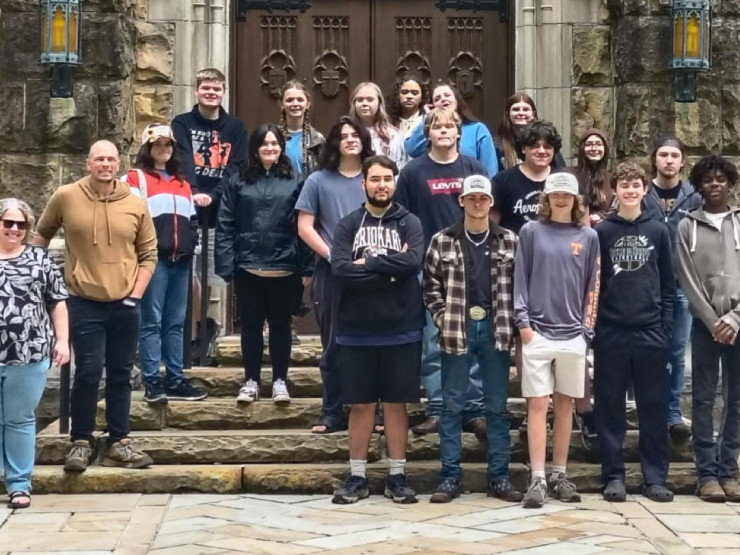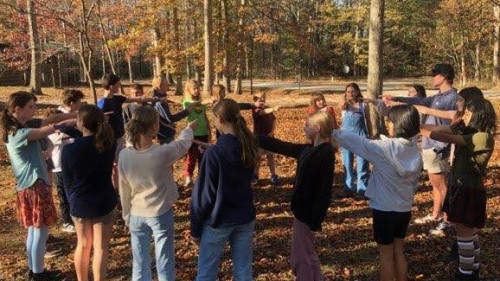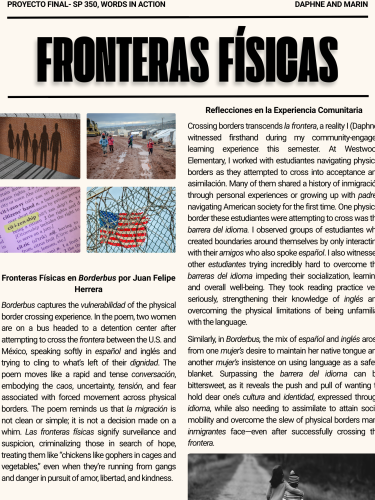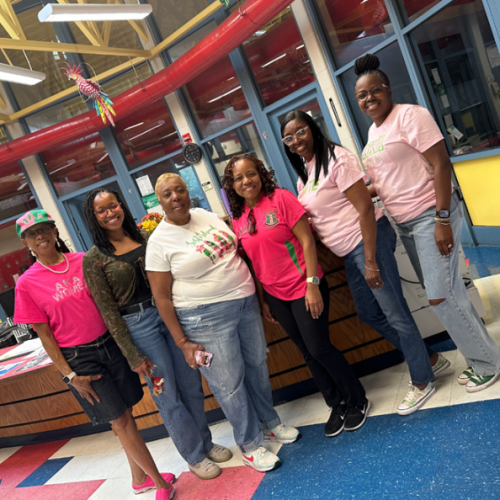Another cohort of Community Engagement Learning (CE-L) Faculty Fellows collaborated during 2024-2025 to continue strengthening the connections between Sewanee and the broader community.
With support from OCE, the Bonner Foundation, The McCrickard Fund, and the Office of the Chaplain, Max Dahlquist (Geology), Eric Ezell (Environmental Studies), Lucía García-Santana (Spanish), and Clarissa Peterson (Politics) each taught a course with a CE-L component, devised a project to support CE-L on campus, and engaged in dialogue with the Faculty Fellows for Purpose and Career.
The faculty fellows´ initiatives showcase the variety of ways CE-L can be incorporated into courses and projects as a tool for community building, social impact, and as the basis of a purposeful education. In Dahlquist´s GEOL 229: “Natural Hazards,” students worked on a semester-long project  analyzing landslide hazards on the slopes around South Pittsburg, TN. They conducted fieldwork on potentially unstable hillsides, dug through newspaper archives for historical incidents, and educated South Pittsburg Elementary School students on landslide processes and hazards. Likewise, Dahlquist's project expanded this educational model by bringing high school students from South Pittsburg's Richard Hardy Memorial School to explore the Split Creek observatory and get an introduction to environmental research on the Domain. This project establishes a model for field trips for young learners while allowing teachers to do place-based case studies with their students.
analyzing landslide hazards on the slopes around South Pittsburg, TN. They conducted fieldwork on potentially unstable hillsides, dug through newspaper archives for historical incidents, and educated South Pittsburg Elementary School students on landslide processes and hazards. Likewise, Dahlquist's project expanded this educational model by bringing high school students from South Pittsburg's Richard Hardy Memorial School to explore the Split Creek observatory and get an introduction to environmental research on the Domain. This project establishes a model for field trips for young learners while allowing teachers to do place-based case studies with their students.
Ezell taught ENST 254 “Equitable Environmental Education,” a course that explores environmental pedagogies to correct historical barriers to access, opportunity, and belonging in nature for marginalized learners.  Ezell's students created a portfolio of resources out of the community work with local partners, such as, among others, the Cumberland Forest School and the Friends of South Cumberland State Park. These collaborations sought to develop environmental literacy, identity, and stewardship in learners of all ages and backgrounds. Ezell also aimed at expanding the CE-L opportunities for Sewanee graduating seniors through a career readiness project consisting of a panel discussion event entitled "Community-engaged Adventures After Graduation," and a repository of resources, which is now posted campus-wide as well as on the websites for OCE and the Office of Career Readiness + Student Success.
Ezell's students created a portfolio of resources out of the community work with local partners, such as, among others, the Cumberland Forest School and the Friends of South Cumberland State Park. These collaborations sought to develop environmental literacy, identity, and stewardship in learners of all ages and backgrounds. Ezell also aimed at expanding the CE-L opportunities for Sewanee graduating seniors through a career readiness project consisting of a panel discussion event entitled "Community-engaged Adventures After Graduation," and a repository of resources, which is now posted campus-wide as well as on the websites for OCE and the Office of Career Readiness + Student Success.
García-Santana's course SPAN 350 “Words in Action: Latin American and Latinx Poetry in Community Engagement” focused on providing the students with the theoretical and analytical equipment to reflect on poetry as a tool for political claims and community building.  By partnering with local organizations like Zeal for Education and Language and Westwood Elementary School, both in Manchester, students applied the in-class study of how poetry has historically contributed to major political claims—during revolutions, against dictatorships, and as a community-building strategy—to their CE experience. Students in the course produced a two-part project comprising a creative outcome (magazine, collage, sculpture) and a poetic analysis in which they reflected on their experiences as ESL teachers and elementary school tutors in the context of the course's content. Likewise, García-Santana's project focused on stimulating CE-L course design by bringing inspiration via recurrent blog entries included in the OCE newsletter. These entries showcase CE-L initiatives on and beyond campus and serve as an archive of courses that can be later used for reference.
By partnering with local organizations like Zeal for Education and Language and Westwood Elementary School, both in Manchester, students applied the in-class study of how poetry has historically contributed to major political claims—during revolutions, against dictatorships, and as a community-building strategy—to their CE experience. Students in the course produced a two-part project comprising a creative outcome (magazine, collage, sculpture) and a poetic analysis in which they reflected on their experiences as ESL teachers and elementary school tutors in the context of the course's content. Likewise, García-Santana's project focused on stimulating CE-L course design by bringing inspiration via recurrent blog entries included in the OCE newsletter. These entries showcase CE-L initiatives on and beyond campus and serve as an archive of courses that can be later used for reference.
In POLS 290 “Voting while Black,” Peterson's students worked during the fall to raise awareness of the historical disenfranchisement of the Black community. In light of the importance of understanding the intentional exclusion of Black people from the political system and how that exclusion impacts participation today, students worked to encourage voting by, among other means,  using social media and contributing to the Chattanooga voter rally before the November 2024 election. In this context, by understanding the impact of history and how academics can shed light on real challenges, students ultimately reflected on the historical differences between communities. Peterson's purpose of bringing awareness to the understanding of these differences extended to her CE-L project. She led the community engagement learning faculty workshop in May, which every year aims at exploring the tremendous opportunities that CE-L can offer faculty for teaching, scholarship, and service, and how CE-L can enhance student learning and engagement in ways that enrich their classroom experiences. In particular, Peterson's contribution to this year´s workshop intentionally addressed the meaning of community as it relates to faculty projects and the university.
using social media and contributing to the Chattanooga voter rally before the November 2024 election. In this context, by understanding the impact of history and how academics can shed light on real challenges, students ultimately reflected on the historical differences between communities. Peterson's purpose of bringing awareness to the understanding of these differences extended to her CE-L project. She led the community engagement learning faculty workshop in May, which every year aims at exploring the tremendous opportunities that CE-L can offer faculty for teaching, scholarship, and service, and how CE-L can enhance student learning and engagement in ways that enrich their classroom experiences. In particular, Peterson's contribution to this year´s workshop intentionally addressed the meaning of community as it relates to faculty projects and the university.
All faculty fellows were enthusiastic about how CEL fostered student learning and excited to see how CEL is becoming an increasingly important component of Sewanee's holistic experience. This year's courses and projects expanded the natural collaboration with the communities beyond campus, and these four faculty look forward to how future faculty fellows and colleagues will imagine their courses within a CEL framework.

